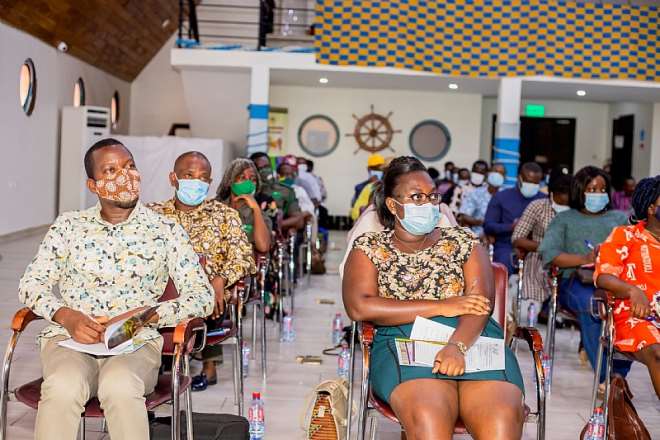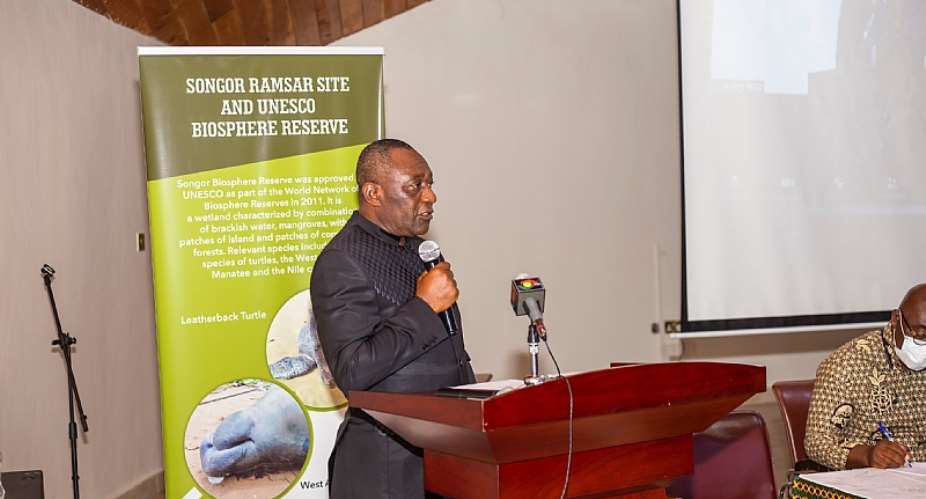The United Nations Educational, Scientific and Cultural Organization (UNESCO), has supported the Environmental Protection Agency (EPA), to organize a national forum on biosphere reserves at the Songor Ramsar Site and Biosphere Reserve in Ada, on 19 November 2020.
The theme for the forum was “Ecosystem Services and Benefit Sharing in UNESCO Biosphere Reserves: Our Role as Stakeholders”. Biosphere reserves are sites that include terrestrial and aquatic ecosystems that promote solutions reconciling the conservation of biodiversity with its sustainable use.
These sites are nominated by national governments and designated under the intergovernmental Man and the Biosphere (MAB) Programme of UNESCO. After UNESCO designates a site as a Biosphere Reserve, it remains under the sovereign jurisdiction of the country. There are currently 714 biosphere reserves in 129 countries, including 21 transboundary sites. Ghana has three biosphere reserves: Bia Biosphere Reserve, Songor Ramsar Site and Biosphere Reserve and Lake Bosomtwe Biosphere Reserve.
The forum was organized to enhance awareness on the MAB Programme and Ghana’s biosphere reserves; to provide a platform for stakeholder networks and establishment of alliances particularly in respect of research and funding; and to highlight the role of stakeholders particularly the youth in management of biosphere reserves and their relevance for attaining the SDGs.
Participants at the forum included members of the Ghana National MAB Committee; Dr. Henry Kwabena Kokofu, Executive Director of EPA; Chief Director of the Ministry of Environment, Science, Technology and Innovation (MESTI); District Chief Executive of Ada East District; the Paramount Chief of Ada Traditional Area, and representatives of youth groups from Ghana’s three biosphere reserves. Representatives of the Austria, Germany, Slovenia and Nigeria MAB National Committees participated in the forum virtually via video-conferencing.
Mr. Abdourahamane Diallo, UNESCO’s Representative to Ghana, in a speech delivered at the forum advocated for the need to use multistakeholder, interdisciplinary and holistic approaches when designing management plans for ecosystems.
He added that stakeholders must stop working in silos, in order to bring to bear all available expertise towards addressing ecosystem management challenges.
He assured participants that UNESCO would continue to support its member states to undertake studies to compare the dynamic interrelationships between natural/near-natural ecosystems and socio-economic processes. In particular, in the context of accelerated loss of biological and cultural diversity with unexpected consequences that affect the ability of ecosystems to continue to provide services critical for human well-being.
In a speech read by Mrs Cynthia Asare Bediako, Chief Director, MESTI, on behalf of the Minister of MESTI, she reminded participants that humans are an integral part of ecosystems.
She gave examples of the benefits or services humans obtain from ecosystems, such as food and water, and climate regulatory processes.
She stated that the term biosphere reserve is not just a designation but a long-term responsibility and project, which must be supported by all stakeholders.
She also advised the youth to take interest in biosphere reserve related activities and to support their implementation.
One of the major activities of the forum was the inauguration of a national MAB Youth Network, comprising youth representatives from the three biosphere reserves in Ghana. Among other things, the aim of a MAB Youth Network is to foster research by youth in biosphere reserves and to increase youth involvement in the MAB Programme.






 Lay KPMG audit report on SML-GRA contract before Parliament – Isaac Adongo tells...
Lay KPMG audit report on SML-GRA contract before Parliament – Isaac Adongo tells...
 Supervisor remanded for stabbing businessman with broken bottle and screwdriver
Supervisor remanded for stabbing businessman with broken bottle and screwdriver
 NDC watching EC and NPP closely on Returning Officer recruitment — Omane Boamah
NDC watching EC and NPP closely on Returning Officer recruitment — Omane Boamah
 Your decision to contest for president again is pathetic – Annoh-Dompreh blasts ...
Your decision to contest for president again is pathetic – Annoh-Dompreh blasts ...
 Election 2024: Security agencies ready to keep peace and secure the country — IG...
Election 2024: Security agencies ready to keep peace and secure the country — IG...
 People no longer place value in public basic schools; new uniforms, painting wil...
People no longer place value in public basic schools; new uniforms, painting wil...
 'Comedian' Paul Adom Otchere needs help – Sulemana Braimah
'Comedian' Paul Adom Otchere needs help – Sulemana Braimah
 Ejisu by-election: Only 33% of voters can be swayed by inducement — Global InfoA...
Ejisu by-election: Only 33% of voters can be swayed by inducement — Global InfoA...
 Minority will expose the beneficial owners of SML, recover funds paid to company...
Minority will expose the beneficial owners of SML, recover funds paid to company...
 Prof. Opoku-Agyemang has ‘decapitated’ the NPP’s strategies; don’t take them ser...
Prof. Opoku-Agyemang has ‘decapitated’ the NPP’s strategies; don’t take them ser...
